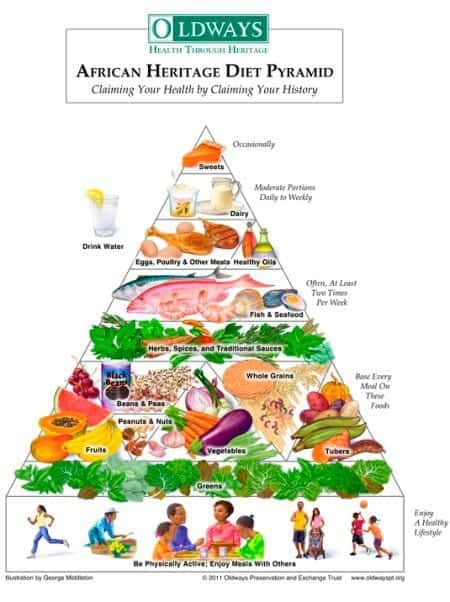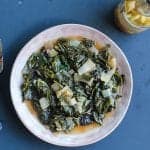Healthy Soul Food and The African Diet
There have been many attempts to define soul food. Without getting deep down into the nuanced minutia of what it actually is, let's just agree that like porn, we know it when we see it. However, might we be too narrow in our consideration of what constitutes soul food. One of the top soul food related google searches is "is soul food healthy." The not so obvious answer is, of course, soul food is healthy! However, like any cuisine, it depends on how you cook it and what ingredients you use.
The Other Soul Food
Growing up with my grandfather was part mental hazing rituals and part silent nurturing. In this way he was a combination of Mr. Miyagi and Master Pai Mei from the movie Kill Bill. Eveything was a teaching moment with him whether you knew it or not. Whenever I strayed from the ways of Judge as he was called by my Grandmother and his friends, he would say "just because you po don't mean you have to act po". After getting over the shock of now knowing we were poor I had to next figure out what in the hell the quote meant. But It applied to everything from the way I dressed and talked to what and how I ate. He wasn't a big fan of traditional "soul food" as it was an aberration in his mind. He talked of the "other soul food" which was that soul food that was dismissed, disregarded, and forgotten in favor of the more common, stereotypical and popular poverty food i.e. pigs feet, neck-bones, chitlins', etc. For him the other soul food was rooted in the cooking he grew up around on the farm as did many other slaves and later free African Americans of the South. Here dishes were rooted in fresh fruit and vegetables grown on the land they worked. The food was nourishing, real, clean, local, from farm to table. Somewhere along the way this type of soul food was forgotten, though in more modern soul food constructs we're seeing more and more of a return and/or resurgence with culinary literature, blogs and restaurants dedicated to this space.
The goodness of Collards, turnips, etc. were bastardized by over-cooking and over-engineering. While my grandmother cooked plenty of fried chicken, hog maws, neckbones, and greens laced heavy with smoked pork for the house, my grandfather had his own separate meal plan. His meals were just vegetables simply prepared with spices, oil, and vinegar, but no fat back. The only time I really saw him eat meat was when he went hunting/fishing or got the hook-up from one of his hunting buddies. So it was fish, venison, and rabbit primarily for him.
Though I loved my grandmother's cooking I cook more like my grandfather, i.e. lean meats, lots of minimally cooked vegetables, and homemade condiments. Even back then he didn't trust food manufacturers and preferred to buy raw ingredients to make condiments and sauces. Judge ate more of an African diet than the Western one adopted by our post-slavery ancestors.
Admittedly, probably like many black chefs/cooks, I've struggled with the "soul food" label at times given its limiting connotations. I kinda rejected soul food label in favor of heritage food. Soul food is limiting in that it doesn't represent the entire African American culinary experience - there is an imaginative and innovative side that doesn't get nearly the same love as it's more popular cousin.
African Diet What Is It?
An African diet is heavy on vegetables and grains. If you look at an African based food pyramid you'd notice the base is vegetables (lots of leafy greens) with much less reliance on meat. Where meat is present it consists primarily of lean meats and fish. And if you look at blacks across the diaspora this pyramid holds true everywhere except among African Americans who favor a Western Diet of convenient, processed food and emphasis on fatty, high cholesterol-bearing meats. Not only are we eating these foods in large amounts, but we are also more sedimentary in our lifestyles vs. the uber calorie-burning lives of our slave ancestors. This is what my grandfather meant by eating like po' people vs. our wokeness rich African ancestors and our brothers and sisters in the Caribbean, South America, etc. who continue to focus on plant-based foods and grains as mainstays to their diets.

Lack of Awareness of African Diet
In many ways, I share some of my grandfather's frustrations regarding our attitudes towards food and health. I get the real challenges, but also see the wasted opportunities. There are many chefs (Bryant Terry, Marvin Woods, Haile Thomas, etc.) and food bloggers (pulledtogether, foodlovetug, thecookinggene) who are evolving soul food, but their efforts and others need to be amplified in the way other ethnic foods continue to be and without appropriation. The African Heritage Diet promotes healthy eating in a relatable way - its simple, tasty, affordable, and consistent with pretty much all the guidelines (nutrient-dense foods vs. high sugar, high fat, highly processed) identified and taught by nutrition experts.
Western vs. African Diet and Implications for Health
I don't need to cite all the statistics that show how black folk are disproportionately affected by diseases such as diabetes, cancer, and cardiovascular. After all, by now, this is rightfully a widely accepted belief. However, it is noteworthy that the public health community is starting to recognize and acknowledge the role that diet plays in all of this, especially cancer.

A 2015 study on 20 African Americans and 20 South Africans in which they switched diets for two weeks demonstrated how a western diet increases the cancer risks for those of African descent. In the study the Africans consumed traditional American food like meat and cheese high in fat content, while African Americans took on a traditional African diet high in fiber and low in fat, with plenty of vegetables, beans, but with little meat. Before and at the end of the two weeks, physicians performed colonoscopies on both groups to assess cancer risks. The researchers also measured biological markers that indicate colon cancer risk and studied samples of bacteria taken from the colon. The findings were quite telling:
- In Africans, the diet changes produced microbiota that were cancerous. At the start, when the groups had been eating their normal diets, almost half of the American subjects had polyps abnormal growths in the bowel lining that may be harmless but can progress to cancer. None of the Africans had these abnormalities.
- The American group had significantly less inflammation in the colon and reduced biomarkers of cancer risk. In the African group, measurements indicating cancer risk dramatically increased after two weeks on the western diet.
- Note in studies on Japanese experience after migrating to Hawaii it took a generation to see the adverse impact of a western diet.
- The risk markers for cancer switched for both groups based on diet change re-emphasizing the impact of high fiber diets in lowering risks of colon cancer
- The fact that improvement occurred in African-Americans occurs in such a short time period means there is hope as it's never too late to change. However, the other view is that if so much can occur in fly a few weeks on a western diet, how much damage can you do over a lifetime.
Ultimately the study reveals the role that socioeconomic factors play in this biological divide. Western diets rely on access to copious amounts of processed and junk foods absent in many other parts of the world especially more rural areas which the African subjects represent. Conversely many African Americans don't have the same access to fresh produce. The study also brings into question how we as a nation preach medical research. Perhaps the model needs to be reevaluated and move from more of a pharmaceutical approach to a dietary and food access approach. This would be more cost-effective, especially in the context of the current policy debates on healthcare. Additionally, it's a more equitable approach, but maybe that's the barrier to such a move, as pharmaceutical companies continue to profit from our poor eating habits.
For easy recipes that represent the healthy soul food try these:




